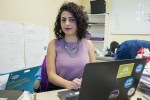Lipaz Ela still recalls when her neighborhood supermarket in Jerusalem was blown up when she was 13 years old. She had gone to the same market the day before.
The daily violence she lived with as a child followed her into her years as an officer for the Israel Defense Forces, in which she worked to improve soldiers’ welfare.
Ela now develops educational programs for Hillel at UCLA in her position as a second-year Jewish Agency Israel Fellow. One program she helps coordinate is Fact Finders, which sends 22 UCLA students, regardless of their faith, to Israel in order to increase conversation between Jewish and Palestinian perspectives.
Hillel at UCLA was the first campus to implement Fact Finders in 2015, and has since sponsored three trips, two of which Ela coordinated. The Fact Finders program has since spread to about 20 other college campuses across North America.
Ela said during the seven years she spent in the army, she concentrated on social work for soldiers and their families.
At 19 years old, she was in charge of 10 soldiers and responsible for the welfare of 1,000 others, primarily educating them on the politics and culture behind their jobs, Ela said.
“I saw and took care of the person behind the uniform, because it’s easy to see soldiers but it’s harder to see human beings,” Ela said.
Ela completed a degree in political science while in the military and was soon accepted as a Jewish Agency Israel Fellow, who are sent to various Hillel centers across North America. Ela asked to be placed in a university that was very political. Her first match was UCLA, and she accepted immediately.
But she said she felt a culture shock in her first month at UCLA because of the strong polarization on campus regarding political climate in Israel.
Through Fact Finders, Ela hopes she can make discussion about Israel more open on campus.
“There’s a difference between a debate and a dialogue,” Ela said. “We need to understand truth is subjective and there are different truths for different people, and that’s okay when you talk to those people and get to know them.”
She said her biggest challenge while developing the program was not letting her personal identity influence the way she ran the program.
Ela said she tried to prevent bias by reaching out to a local Palestinian woman in Israel to provide the opposing perspective.
“I wanted people that are sharing their own stories,” Ela said. “It was important for me to show the identity and the pain of both people, because they want to be identified (for both Israelis and Palestinians).”
Ela’s ideal Fact Finders trip still has not happened, she said. She would like to incorporate more students who do not have a personal stake in the conflict, and more who identify with the Palestinian narrative.
Sharmin Khondaker, a third-year political science student and president of the Bangali Students Association, was one of the first Muslim students on the Fact Finders trip in December. Khondaker said that because she grew up with a Palestinian perspective, she was skeptical of bias during the Hillel-sponsored trip.
“No matter how much they try, it was always inevitable (that the trip would be biased),” Khondaker said. “What I saw from Lipaz was that they tried hard to compensate for that.”
Khondaker said she was initially fearful of expressing her opinion during group discussions. She said she later spoke to a Jewish UCLA student on the trip who shared the same fear.
“A lot of the other students on the trip approached me and asked if I was doing ok,” Khondaker said. “They made sure we were comfortable, and recognized that (some conversations) were difficult for me.”
Arielle Yael Mokhtarzadeh, a third-year communication studies student and president of Bruins for Israel, applied for the December trip because she said she wanted to challenge her beliefs.
“At this point in my life I am able to find a way to reconcile different opinions,” Mokhtarzadeh said. “Going on this trip enabled me to come back to campus more informed and lead a more inclusive conversation about conflict on campus.”
Mokhtarzadeh said the most powerful moment she experienced on the trip was unplanned. While the group was listening to a Palestinian man speak, Ela and the man realized she and his family came from the same town, were the same age and had fought on opposing sides during the same battles.
“Two people lived parallel lives and were able to come together and humanize one another,” Mokhtarzadeh said. “For me that was everything Fact Finders was about.”
Fact Finders will screen a film about students’ experiences in the spring and organize a panel to share stories they heard during the trip with the UCLA community.
Though Ela does not know what her role will be when she returns to Jerusalem in June, Ela said she hopes to use conversation to bridge the gap in the Israeli-Palestinian conflict.

Sounds cool. Lipaz–if you see this–you’re awesome.